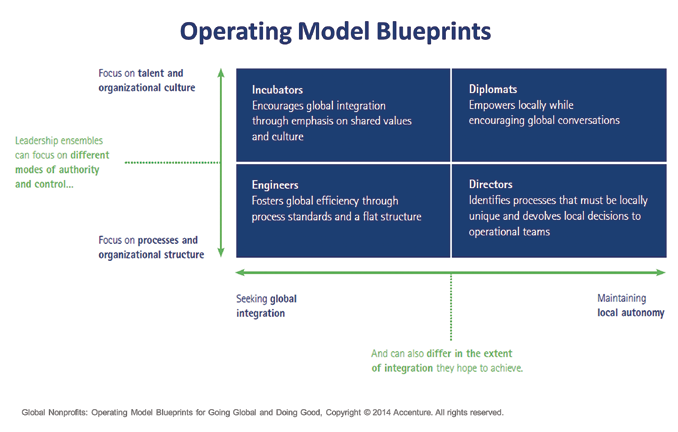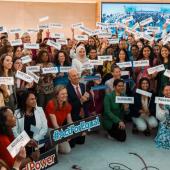
CHEAT SHEET
- Defining charity. Not all countries have the same legal definition of what a charitable mission is under the local legislation. It’s important to determine whether your initiative is considered to be charitable within the appropriate jurisdiction.
- Privacy is policy. Privacy laws vary widely between countries, and penalties can be substantial. In-house counsel should be especially mindful when collecting personal information in countries with strict privacy laws.
- Breaking brand. When entering a new country, be aware that intellectual property laws surrounding your brand may not apply anymore. Consider registering your trademark in the host country to ensure brand protection.
- Lost in translation. Certain charitable strategies that are acceptable in one country may not be culturally appropriate in other countries. Spend time finding out whether your idea will translate within this new framework to increase the chances of success.
Charitable organizations around the world serve a critical purpose to help society, from protecting the environment to feeding the hungry. As organizations in the United States look for new ways to increase their impact, many seek to do so by expanding their activities across borders. If your organization is considering working in other countries, you should not underestimate the complexity of working in other countries nor should you make assumptions about the applicable laws or legal structures. Based on my experience advising 501(c)(3) tax-exempt organizations expanding across geographies, here are some practical things to consider before you put boots on the ground. These tips are intended to help organizations as they seek legal advice in the nonprofit world.
Is your mission considered charitable in other countries?
Not all countries have the same legal definition around what a charitable mission or purpose is under the local legislation. For example, although your mission is perceived as charitable in the United States, it may not be everywhere. According to “A Tax Guide for Charitable Institutions and Trusts of a Public Character,” in Hong Kong, a charitable purpose is defined as: relief of poverty; advancement of education; advancement of religion; or other purposes of a charitable nature beneficial to the community not falling under the above. Activities falling within the fourth category will only be regarded as charitable if they are of benefit to the Hong Kong community.
Based on this definition, there could be some organizations with missions that are considered charitable in the United States, but not in Hong Kong. Before you look to expand your charitable mission to other countries, regardless of whether you will generate income, first determine whether your activities are charitable and legal within the local jurisdiction. One way to do this is to talk to other organizations with similar missions that are operating within the targeted country: Are they considered a charitable, or similar, organization? Do they have any specialized permission to provide their services within the country? Does the government condone their services? These types of questions will help you determine whether you can even send individuals to the country to activate your mission.
Are you legally allowed to have a physical presence in a country?
Even if your mission is considered charitable under local laws, you may be considered to be operating a business within the country. Sending staff to a country to provide mission-related services can be viewed as expanding the operations of your nonprofit corporation within a new geography. For example, there have been reports that, in the United Arab Emirates, targeting citizens of some countries through use of social media or on your website could be considered an unauthorized activity in a country.
Before you establish a physical presence, the key question you will need to consider is: Where are your activities being performed? If you are primarily performing your charitable work in the United States, then even traveling abroad to share findings or best practices may lead some to believe that you are performing a service within their borders. You may also need to consider the type of visa your staff has been issued and how that ties to the work being done within the country, and whether payment will be made for any services.
You may also need specific permission from a government to operate within a country, sponsorship by a government agency, or to set up a local entity or representative office in a country.
Can you transfer funds outside of the foreign country to the United States?
If you collect or receive funds within some countries, whether from other organizations or from individuals, foreign exchange controls or other similar restrictions may apply. You should get a clear understanding of the fund-transfer framework before you accept funds within another country.
You also need to ensure that you are complying with US laws such as the Foreign Corrupt Practices Act (FCPA) and requirements of the Office of Foreign Asset Control (OFAC), which often are considered to apply in the for-profit world, but also impact nonprofit activities. You could also be subject to local anticorruption laws and other restrictions when accepting funds from within certain countries, depending on the context, purpose, and the country within which you collect funds.
Don’t assume that your income will be tax-exempt.
If you accept funds within another country, or spend US-sourced funds within such country, you may be subject to taxation. Not all countries consider charitable organizations to also be tax-exempt; your organization may not be considered charitable; and the other country may not honor a US-tax exemption framework. Activities could be subject to a value added tax (VAT), which taxes every step in the supply chain before the ultimate consumer, or other taxes that are unlike those imposed in the United States.
You should also keep in mind that some activities outside of the United States could be considered unrelated, and have potential US tax implications as well, such as triggering unrelated business income tax.
Can you collect information from or about citizens and use it to further your activities in the United States?
US privacy laws are structured differently from those of many other countries. If you operate outside of the United States and want to collect information about citizens of a country, your standard practice in the United States may not meet the standards or laws of the foreign country. You may not be able to collect the information for the expected use, nor will you be able to store the data on a US-based server, or transfer the data to the United States for use in the United States. Countries have varying requirements for the collection, use, and transfer of data. For example, the privacy laws in Europe and Canada differ from those in the United States. Advice from an experienced data privacy expert who is familiar with cross-border transactions is critical to ensure that you are complying with requirements for data collection, use, transfer, and storage, and the right to be forgotten. One helpful global resource can be found at www.dlapiperdataprotection.com.
The new European Union General Data Protection Regulation (GDPR) should also be considered, since its fines and penalties apply beyond Europe. See www.eugdpr.org for more information.
Citizens of many countries have an expectation of privacy as a consumer that is much different than expectations in the United States. You may not be allowed to contact them for fundraising purposes without ensuring that you have properly collected and retained their information. You should be especially mindful about collecting information from or about children in other countries.
Personal information in other countries could include a person’s name and address, credit card number, and image or voice. Cultural sensitivity is also very important to take into account, as well as whether collection, use, retention, or transfer of any information that could identify a person is legal.
Are the legal structures of another country like those within the United States?
In the United States, unless you are told you can’t do something, or something is considered illegal, you usually can conduct certain activities within the bounds of the law. However, outside of the United States, you can’t often do something without explicit permission. Don’t assume that you can perform your mission within a country simply because you don’t see any prohibition against the conduct. Cultural sensitivities and legal education and knowledge are critical to ensure that you are not breaking the law. Many governments are increasingly turning their attention to the regulation of charitable activities, as is further detailed in the NonProfit Quarterly.
Will your intellectual property rights be protected?
When you send your staff into another country, you may assume that you own what they create because of how intellectual property rights ownership tends to be structured between employees and employers. However, without having a clear writing that complies with local law, US IP structures may not apply in the host country. You should also be mindful of IP laws for volunteers and independent contractors that you use or hire in host countries.
Separate from creation of IP, many countries have significant counterfeiting operations, even if they are signatories to the Madrid Protocol. Once you bring a brand into a new country, you should consider registering your trademark to at least have an option to protect your brand if it is used or counterfeited in another country. You should also consider whether your intellectual property is infringing on exisiting IP in another country.
Can you operate using your US entity and US staff?
Once you know that you can operate within a country, you will need to determine whether you can operate from your US entity located in the United States, whether you will need a representative office, or whether you should set up a local entity. These decisions often tie to revenue-generating activities, but they could also be impacted by the risk profile of the activities in which your organization engages. Whether you send staff, hire a contractor, or use volunteers will also be a determining factor, and could also impact whether they are considered your agent. It is important that you ensure that you consider the labor laws of a country to better understand what the implications are of individuals working on your behalf, and that you are in compliance with those laws.
Once you know that you can operate within a country, you will need to determine whether you can operate from your US entity located in the United States, whether you will need a representative office, or whether you should set up a local entity.
Will you have to share financial information with a foreign government that you may not be required to share with the US or state governments?
Foreign governments have very different expectations for companies that operate within their borders. They may require much more, or different, information about your operations. If you seek to begin operations in a foreign country, you should expect to have to provide information about your financial structures, revenue streams, and expenses. You should not assume the type of information or level of detail expected by a foreign government to enable you to operate within its borders.
Before you embark on expanding your mission to a new country, spend time finding out if your idea will work within the legal and cultural framework of a different country or culture, so that you can increase the chance of success.
Will your idea translate readily to other cultures or languages?
Some charity names or brands don’t translate to have the same or similar meaning in other languages, or have no translatable meaning in other cultures. They could also be confused with existing names or brands within a country. Before you embark on expanding your mission to a new country, spend time finding out if your idea will work within the legal and cultural framework of a different country or culture, so that you can increase the chance of success.
These practical approaches are intended to help you think through various aspects of expanding internationally, as you seek legal counsel to guide your decisions.

Other great resources
These resources will help answer other questions you may have about expanding your nonprofit to other regions.
“Protecting Employee IP in a Global Environment”
“Top Ten Risks Facing Nonprofits Operating Internationally”
“Overseas Operations: What Every Nonprofit Should Know Before Crossing US Borders”
“Nonprofits – International Charity Activities”
“Regulation of Nonprofit and Philanthropic Organizations: An International Perspective”







